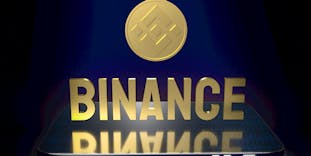Binance vs eToro – Which Trading Platform Is Better For You?
All products and services featured are independently selected by WikiJob. When you register or purchase through links on this page, we may earn a commission.
Don’t invest unless you’re prepared to lose all the money you invest. This is a high-risk investment and you should not expect to be protected if something goes wrong. Take 2 mins to learn more at https://etoro.tw/44JRWLY.
- Introduction to Binance vs eToro
- What Are the eToro and Binance Platforms?
- Binance vs eToro: Markets Offered
- eToro vs Binance Fees
empty
empty
empty
empty
empty
- eToro vs Binance: Customer Support and Research
empty
empty
empty
empty
- Binance vs eToro: Security and Regulations
- eToro vs Binance: Getting Started
empty
empty
- Frequently Asked Questions
- Final Thoughts
For those solely interested in buying, trading, or investing in cryptocurrencies, Binance is the clear winner due to its extensive cryptocurrency offerings.
For individuals interested in creating a portfolio that includes more traditional assets such as commodities, forex and a social trading platform, eToro is the better option.
Introduction to Binance vs eToro
Choosing the right trading platform can take time and effort for those looking to invest.
There are several online trading platforms available for novice and experienced investors.
With factors such as fees, accessibility, security, quality of customer service and learning tools to be considered, finding the right trading platform to meet your short and long-term investment needs can take time.
This article reviews and compares the two popular trading platforms:
You will look at how each platform fares when it comes to the essential considerations traders need to take into account.
This can help you decide which trading platform to choose based on your short and long-term trading and investment needs: eToro vs Binance.
Don’t invest unless you’re prepared to lose all the money you invest. This is a high-risk investment and you should not expect to be protected if something goes wrong. Take 2 mins to learn more at https://etoro.tw/44JRWLY.
What Are the eToro and Binance Platforms?
Those looking to start or continue their trading career should be familiar with the eToro and Binance trading platforms.
Both platforms are well-known, reputable trading platforms that enable investors to trade various financial instruments on global financial markets.
This also makes it challenging to select which trading platform is best: eToro vs. Binance.
Binance is one of the world's largest cryptocurrency trading platforms, offering a wide range of cryptocurrency trading options.
Its main selling point is its comprehensive suite of cryptocurrency-related services, such as spot trading, futures trading, staking and lending.
The exchange was founded by Changpeng Zhao (CZ) in 2017. Zhao was a well-known cryptocurrency industry veteran who had worked at Bloomberg and Blockchain.info.
Alongside its extensive selection of cryptocurrencies to trade, the platform is best known for its security, using several methods to protect users' identities and funds.
eToro is a social trading and multi-asset brokerage platform founded in 2007 by brothers Yoni Assia and Ronen Assia, and David Ring.
Its main selling point is social trading, allowing users to follow and copy the trading strategies of other successful traders. eToro offers several financial instruments to trade, including stocks, cryptocurrencies, commodities, forex and more.
In addition to eToro's innovative approach to trading, the platform has a strong global reputation, with the platform being regulated in several countries worldwide.
Binance vs eToro: Markets Offered
When deciding on eToro vs Binance, a significant factor to consider is the markets and financial instruments you want to trade in.
Binance focuses on cryptocurrency markets. It offers a wide range of cryptocurrencies for trading, such as Bitcoin, Ethereum, Ripple and various altcoins.
Binance also provides cryptocurrency-related services such as futures trading, staking, lending and Binance launchpad for participating in new token sales.
eToro offers a broader range of markets and products, making it suitable for traders and investors interested in a diverse investment portfolio.
These include:
- Stocks: eToro allows you to trade and invest in stocks from various global markets, including the US, Europe and Asia.
- Cryptocurrencies: eToro offers a selection of cryptocurrencies, similar to Binance.
- Commodities: gold, oil and silver
- Forex: eToro provides access to the foreign exchange market.
- Indices: representing global stock market performance
- ETFs (exchange-traded funds): eToro offers a variety of ETFs for diversification.
- ISAs allow UK residents to enjoy tax benefits while trading or investing in stocks and other assets.
eToro also provides innovative products like copy portfolios, where you can invest in diversified portfolios managed by experts.
eToro vs Binance Fees
Consideration should also be given to the hidden costs and fees of using trading platforms.
These fees include open and closing accounts, inactivity, minimum deposit, and expenses associated with trading different financial assets.
Outlined below is a comparison of the main fees charged and how eToro and Binance compare when it comes to fee structures.
Account Opening Fees
Both Binance and eToro do not charge any fees for opening an account.
Deposits/Withdrawals
Binance offers a wide range of cryptocurrency deposit options, most of which do not have fees.
Withdrawal fees vary depending on the cryptocurrency being withdrawn, and the fees are typically dynamic, adjusting to network congestion and fees.
Binance also supports bank transfers and credit/debit card deposits, which may have associated fees depending on your payment provider.
eToro deposit fees vary depending on the payment method used. eToro accepts various payment methods.
eToro fees can range from zero to a small percentage of the deposit amount, depending on the method and your location.
Withdrawal fees apply and vary by currency, ranging from $5 to $25 for each withdrawal, with a minimum withdrawal amount of $30.
Trading/Buying Fees
eToro vs Binance fees vary in terms of their structure.
Binance has a tiered fee structure for trading based on your trading volume and Binance Coin (BNB) holdings. Fees can range from 0.1% to 0.02% per trade, with discounts available for using BNB.
eToro uses a spread-based pricing structure. The spread varies depending on the asset being traded and market conditions, meaning the fees also vary. So eToro crypto fees might be different from its stock fees.
eToro also charges overnight fees for positions held overnight.
Inactivity/Closing Account
Binance does not charge an inactivity fee, whereas eToro charges an inactivity fee of $10 per month if you don't log in for 12 or more months.
There is no fee on either platform for closing your account.
Minimum/Maximum Deposits
The minimum deposit amount for eToro varies by region and payment method but is typically around $50. Binance does not stipulate a minimum deposit amount.
There is no maximum deposit limit on either eToro or Binance.

Don’t invest unless you’re prepared to lose all the money you invest. This is a high-risk investment and you should not expect to be protected if something goes wrong. Take 2 mins to learn more at https://etoro.tw/44JRWLY.
eToro vs Binance: Customer Support and Research
Customer support and educational tools are essential to any trading platform. Novice traders can benefit from resources, tutorials and videos on successful trading strategies, while the more experienced investor can master their trading knowledge and theories.
Outlined below are some comparisons.
Guidance for Beginners
Binance includes a dedicated educational platform for beginners with articles and videos covering cryptocurrency and blockchain topics.
The platform also has a ‘Learn & Earn’ section where users can participate in educational quizzes and earn cryptocurrency rewards.
eToro offers a range of educational resources also suitable for beginners, including video tutorials, webinars and a blog with market insights and trading tips.
The platform also has a virtual portfolio mode, meaning beginners can practice trading without risk.
Research Tools
Binance provides advanced charting tools, technical analysis indicators and a trading view with multiple charting options.
Binance also publishes in-depth reports and analyses on cryptocurrencies and blockchain projects.
eToro also provides various research tools, including charts, technical analysis indicators and a social news feed where users can discuss market trends and news.
News Features
Both eToro and Binance offer news resources that provide details on market developments.
eToro also includes a news feed that combines financial news and updates relevant to the assets available to trade on the platform.
Customer Service
Binance offers a 24/7 live chat service, email support, a comprehensive FAQs section and a customer support Twitter account for updates. The platform is known for its quick response times (usually minutes to a few hours through the live chat service).
eToro Customer support is available during business hours, Monday to Friday. The social trading platform allows users to seek assistance and guidance from the trading community any time.
Binance vs eToro: Security and Regulations
When comparing the two platforms on security and regulation, there are a few notable differences, especially when it comes to the regulatory aspects.
Both Binance and eToro platforms place an emphasis on user security.
To enhance account security, Binance offers two-factor authentication (2FA). This includes SMS authentication, Google Authenticator and hardware security keys. eToro also offers two-factor authentication (2FA).
Both eToro and Binance provide withdrawal restrictions. eToro has withdrawal restrictions in place to prevent unauthorised withdrawals, including verifying the identity of users for large withdrawals. eToro also uses encryption protocols to protect user data.
Binance has a withdrawal safelist feature where users can set up a list to specify trusted withdrawal addresses, adding an extra layer of security. The Binance platform also includes an anti-phishing code that users can set to protect themselves from phishing attempts.
In a further commitment to security, Binance operates a secure asset fund for users (SAFU fund). This is used to compensate users in case of security breaches or unforeseen events.
One of the significant differences between Binance and eToro is between each platform's regulatory compliance. eToro complies with regulatory standards in various jurisdictions, which include security and data protection requirements. This includes being registered with the Financial Conduct Authority (FCA) in the UK.
Binance is not regulated by the UK's FCA, as it operates a cryptocurrency exchange.
eToro vs Binance: Getting Started
Getting started on both platforms is essentially the same.
To open an eToro or Binance account, you must provide standard identification documents, such as a passport or driver's licence and proof of address. The signup process on both platforms is relatively quick.
Users can complete the registration process in minutes if they have the necessary documents ready for verification.
Available Platforms
eToro offers a web-based platform accessible from most web browsers as well as mobile apps for both iOS and Android devices.
Binance also provides an accessible web-based platform and dedicated mobile apps for both iOS and Android devices. A desktop application for advanced trading is also available. There is also a Binance copy trading platform.
Demo Account
eToro offers users a demo account option. This allows users to practise trading with virtual funds, which is helpful for beginners who want to practise on the platform before using real money.
Binance doesn't offer users this functionality on the platform.
Frequently Asked Questions
To trade on eToro, individuals should sign up for an account, complete identity verification and deposit funds. Choose an asset to trade, choose your investment amount, and trade, making sure to set stop-loss and take-profit levels if required.
eToro withdrawal processing times can vary. Typically, it can take anywhere from one to eight business days for withdrawals to be processed and funds to reach your account. This is location-dependent.
To sell cryptocurrency on eToro, select the cryptocurrency you wish to sell and the amount you want to sell. Confirm the trade by clicking ‘Open Trade’.
To withdraw funds from Binance, navigate to the wallet section and select withdrawal options. Choose the cryptocurrency you want to withdraw, enter the withdrawal address and amount, and complete the security verification. Confirm the withdrawal via email.
To short, go to the trading section on your Binance account. Choose the trading pair you want to short, then the short option. After deciding your trade options, make the short order.
To use Binance, create an account and deposit funds. Familiarise yourself with the platform and how to go about executing your desired trades. Make use of the resources on Binance to manage your portfolio and monitor market activity.
Making $100 a day on Binance is not guaranteed. Careful analysis of market trends, risk management and selecting suitable assets with potential is needed. Investment and trading carry risk.
It is worth remembering that trading cryptocurrency is highly speculative and has a greater risk than traditional financial assets.
Final Thoughts
Choosing the best trading platform requires careful consideration of criteria and short and long-term investment goals. Those deciding between Binance vs. eToro should first think about what assets they are looking to trade in.
For those solely interested in buying, trading or investing in cryptocurrencies, Binance is the clear winner. The platform has extensive cryptocurrency offerings and specialised services that cater to those trading in cryptocurrencies.
For those looking for a more diversified portfolio such as stocks, commodities, forex, as well as a social trading platform, eToro is the better option.
eToro provides a broader range of trading options, making it suitable for those trading traditional and digital assets as well as less experienced investors.
In terms of getting started, eToro is often considered more beginner-friendly due to its demo account, where users can practise trading with virtual funds.
Binance also provides a straightforward signup process and offers various platforms, but it doesn't offer a demo account, which can be a drawback for those who prefer to practise before trading with real funds.
When choosing between Binance vs eToro, in addition to considering your trading preferences and asset selection, fees, security and preferred payment methods must be factored in. This ensures you choose a platform that aligns better with your financial goals.
Binance and eToro offer important security features like two-factor authentication to help protect user accounts. eToro has an advantage in the UK, as it is regulated by the FCA, which can provide users with a higher level of confidence in terms of regulatory oversight and investor protection.
In evaluating your short- and long-term needs and goals, you can choose the trading platform that caters to your requirements now and in the future.
eToro is a multi-asset platform which offers both investing in stocks and cryptoassets, as well as trading CFDs.
61% of retail investor accounts lose money when trading CFDs with eToro. You should consider whether you understand how CFDs work, and whether you can afford to take the high risk of losing your money. Don’t invest unless you’re prepared to lose all the money you invest. This is a high-risk investment and you should not expect to be protected if something goes wrong. Take two mins to learn more.
This communication is intended for information and educational purposes only and should not be considered investment advice or investment recommendation. Past performance is not an indication of future results.
Copy Trading does not amount to investment advice. The value of your investments may go up or down. Your capital is at risk.
Don’t invest unless you’re prepared to lose all the money you invest. This is a high-risk investment and you should not expect to be protected if something goes wrong. Take two mins to learn more.
eToro USA LLC does not offer CFDs and makes no representation and assumes no liability as to the accuracy or completeness of the content of this publication, which has been prepared by our partner utilizing publicly available non-entity specific information about eToro.
WikiJob does not provide tax, investment or financial services and advice. The information is being presented without consideration of the investment objectives, risk tolerance or financial circumstances of any specific investor and might not be suitable for all investors. Past performance is not indicative of future results. Investing involves risk including the possible loss of principal.
Don’t invest unless you’re prepared to lose all the money you invest. This is a high-risk investment and you should not expect to be protected if something goes wrong. Take 2 mins to learn more at https://etoro.tw/44JRWLY.





